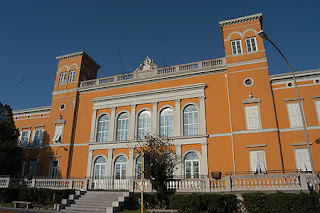
Coming from the Information Technology field, where changes are happening at the speed of light and where new paradigms are introduced almost annually, back in my mind I always had prejudice that, so called, traditional businesses are businesses that are waiting to be thrown into oblivion by some technologically more advanced product or new breakthrough in the field. While, this definitely has happened and may happen to some "traditional" businesses, many of them seem to thrive and even effectively use innovation in their production, for the benefit of all of us. A short trip to Trieste and Slovenian coast last weekend gave me some interesting examples of how "traditional" businesses can prove to be very vibrant and innovative.
First "station" on the trip was visit to the MIB School of management where our MBA group from Bled was guest of the faculty. During our visit we were present at the interesting lecture by Professor Stefano Pilotto: The Italian Economic System and the World Challenge. The main issue of the lecture was role of the Italy and its economy in the world that is changing rapidly. Without going much deeper in this complex issue, I can say that my impression is that Italian response is like this 20-years old MBA school that attracts students from all parts of the world in a beautiful 19th century palace that you can see on a picture above: integrating modern approaches and methods with a rich historical and cultural heritage.
After the visit to the school, we went to visit the company that is an example of a typical successful Italian business: Illycaffe S.p.A. Illycaffe, like most Italian companies, is family owned, has long tradition and is competing on the world market by focusing on what they are doing the best: producing premium brand of the coffee. On the IEDC we were using Illycaffe as example of a company that has integrated through value chain, from production of coffee beans through distribution and consumption of coffee, but I wasn't aware of how big and modern this enterprise is. I mean, how difficult this business can be? Process of making coffee is centuries old: you take coffee beans, roast them, grind them, boil them and you have a beverage that is so popular in western world! But, during visit to the factory, I saw that there are innovations happening in each stages of this process, in fact so many of them that two coffee universities (!?) have been established by Illy in Trieste and Sao Paolo! And classroom of the university in the Trieste, based on what I have seen, is technologically more advanced than any of the classrooms of IT companies that are specialized in technology education!
Next day, after a splendid dinner with students of MIB, we went to "Sečovlje", Slovenian Natural Park situated on the southwest border with Croatia, which is still used for salt production. If coffee making was for me traditional business, than salt making is ultra-traditional business. It is hard to imagine more basic product than salt, and the process of production of salt in Sečovlje remained basically the same from 14th century till now! Nevertheless, Sečovlje has managed to survive and to establish itself as a premium producer of several salt products, of which one of them: salt flower, I have bought for use in my kitchen.
After this short trip of one and a half of day, we have returned to Bled, where I summed my impressions and prepared myself for the last module and big discussions about International Political Economy this week. But, more about that in later posts.

No comments:
Post a Comment